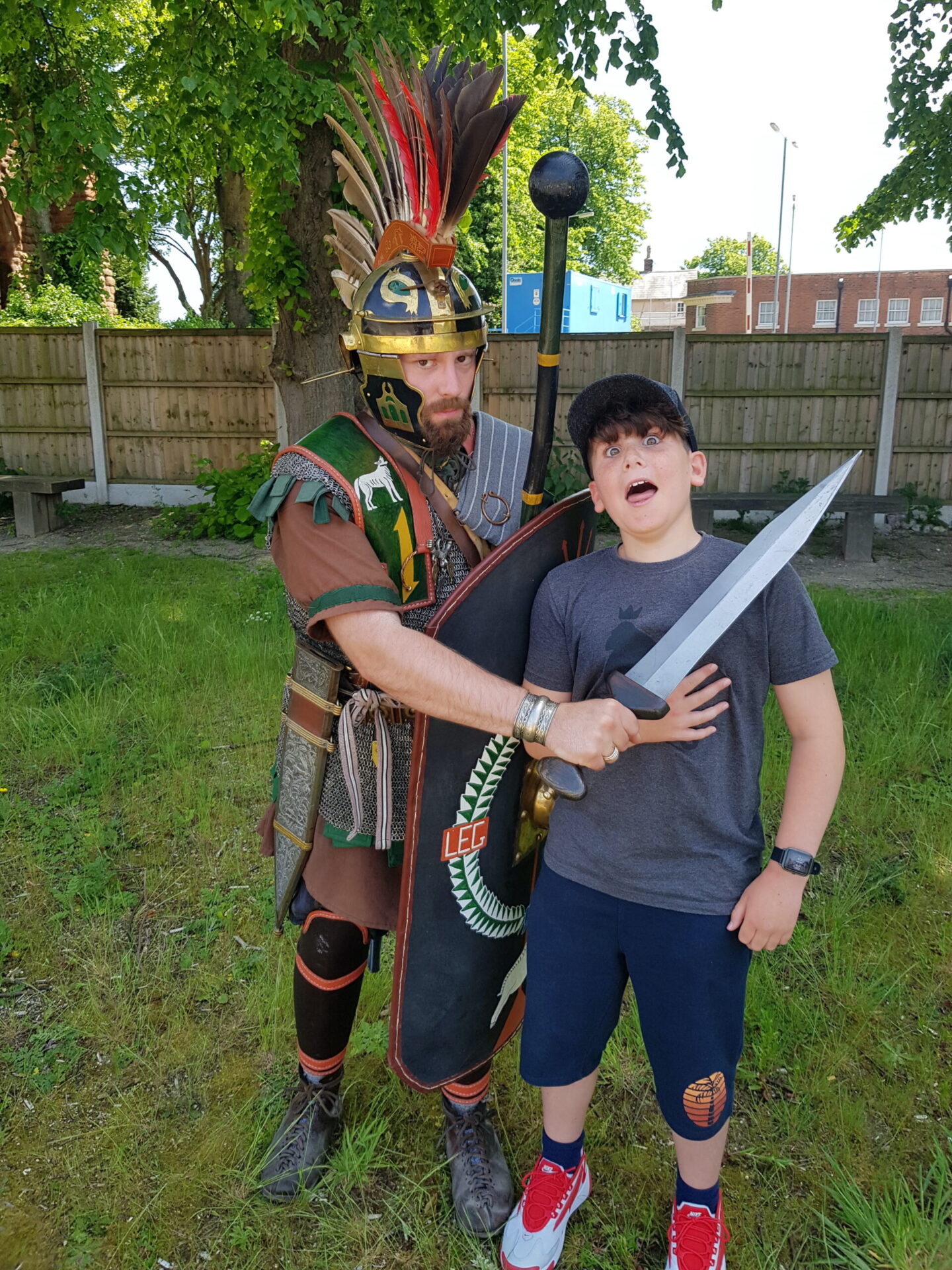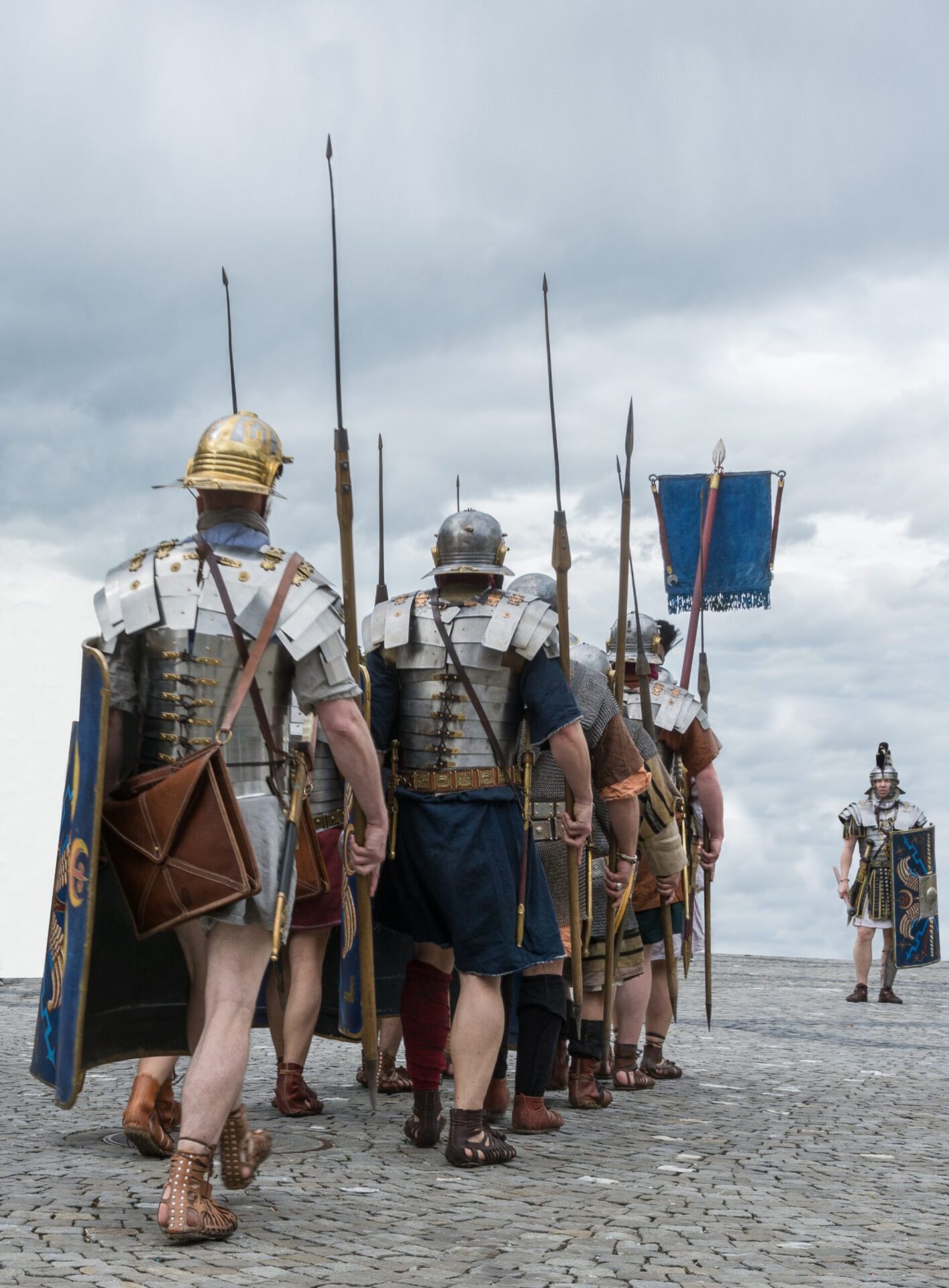Podcast: Play in new window
Name that chat – review
After last week’s article about discourse, dialogue, diatribe and debate, did you get a chance to think about your default conversation type? Are you happy to sit back and listen? Do you like arguing your case? Could you spot a family member spiralling into a diatribe?
As promised, here are the two conversations that inspired this series:
What the Roman taught me
I decided to opt for the top two attractions on Trip Advisor when visiting Chester recently. Number one was the zoo, number two was ‘A walking tour with an Authentic Roman Soldier’. Striding around in his handmade leather boots, full armour and feather-adorned helmet, I quickly came to realise that our guide, Atticus wanted to live in Roman times. According to Atticus, nothing has surpassed what the Romans taught us. We have never been as civilised as in Roman times, the plumbing system was spectacular, the plastic surgery was almost on a par with the medical know-how of the present. Even the concrete used was superior to anything any country uses today.

We enjoyed posing for photographs at the amphitheatre, watching how to kill someone properly with a Gladius (the films don’t do it right), and soaking up a lot of gruesome information to bore people with when we got home. In fact, I couldn’t get this soldier and his bountiful knowledge out of my head! Why had this walking tour had such an impact, I wonder? I do like this sort of thing, so I was bound to be listening and wanting to learn as much as I could. However, what captivated me was the guide’s absolute confidence in his belief that the Romans were the bee’s knees. He was so passionate and assured that it made listening to his diatribe very convincing. He did attempt some dialogue – his questions left us in awkward silence until someone felt bad about this and attempted a guess at an answer. Most of the time it quickly became apparent that it was a ridiculous attempt and, suitably embarrassed in front of a handful of strangers, we traipsed on in silence behind him in the midday sun, admonished for being such plebs. This was a less appealing side to the tour!

Worried that I had developed a crush on Atticus, I mused on the experience to work out why I couldn’t get him out of my head. Relieved to find that I was attracted to his passion for his subject rather than his uniformed appearance, I realised that the soldier had a motive, a draw, and a hope.
His motive: to persuade us that the Roman Empire was the most impressive and advanced civilisation ever – unsurpassed by any before or since.
His draw: He obviously has a captive audience of paying ticket holders but his enthusiasm, knowledge, and determination to be ‘authentic’ in his dress and beliefs gave him credibility.
His hope: Maybe his interest in a highly successful historical empire was intensified by a dissatisfaction with the present political, cultural or religious societies. He hoped to pass on this interest in Roman life and recruit people to contribute to a new living history exhibit. He also wanted a five-star Trip Advisor review! Or maybe his hope lies in time travel so he can go and join the society he reveres. If I could sit and share a plate of dormice and fish sauce with him, I’d want to find out where his hope really lies.

What the crypto investor taught me
Next time you’re with someone younger or techier than yourself, please ask them what they think of Bitcoin or any other cryptocurrency. I guarantee it will spark conversation around the dinner table. There’s a whole movement of people who are evangelistic about the benefits of investing in invisible money and the teenagers in our lives know all about it because of Elon Musk, CEO of Tesla Motors.

The topic came out of the blue for me when a fellow mum and I were laden down with lunchboxes and bookbags at the park one day. She was about to round up her charges and encourage them to get back to the sofa to play blockchain games to earn cryptocurrency. Wayfarer, Huntercoin or Splinterland, I can’t remember which one it was, but she was so animated and excited by the potential of these online communities and the investments she had made in cryptocurrency that the boys had another 20 minutes on the field while she pitched the concept to me.

I gathered that her interest peeked during lockdown – she and her partner wanted a project and this suited their skills and interests. They’re entrepreneurial, intelligent and happy to take calculated risks.
Why was she so evangelical? Why did she spend 20 mins telling me about it? I think mainly it was because we had the time. Our children were somewhere in the park, there was nobody else to interrupt the conversation, and I like to ask questions. I was a captive audience and she was all set to persuade me that this is the future and to entice me to invest (the more buy-in there is, the higher the value of the currency).

What effect did it have on me? I kind of thought she was a bit loopy but she got my attention! She made me think, it sparked lots of discussion at home and with other friends and family. It made me realise I don’t really know anything about Bitcoin or other cryptocurrencies so I started reading up on it.
I haven’t been converted but I have made myself have a more open mind. It was nice to stand back and listen to someone speaking so animatedly. I got to know her and hear the journey from her initial investments to seeing them grow each week.
Her motive: This may have been to convert me into an investor, or just to share a bit about her interests.
Her draw: For me, this was probably my curiosity and the opportunity to stand back and not feel responsible for making conversation
Her hope: Like anyone businessperson or investor, her hope lies in a better future, financial security and providing for her children’s higher education. Also, maybe she hopes to leave a legacy, to have played a part in what many see as the future of worldwide currency and investments.

In Conclusion
Did I think both of these people were a little mad? Yes. Was I taken aback by their hyper-enthusiasm for their cause? Yes. But I have continued to spread and analyse their messages, discuss them with extended family, read up on them and do my own research.
Do any similar conversations spring to mind? How have these conversations got me thinking about evangelism? Look out for next week’s article to find out.

